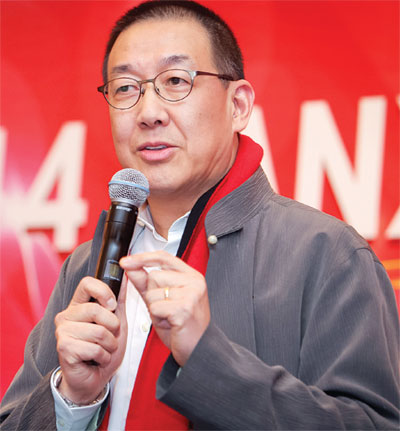Making 'green' tires to suit China
Lanxess local unit's chief Ming Cheng Chien, knows what it takes to succeed on home turf
Ming Cheng Chien, 60, CEO, Greater China, Lanxess, the German specialty chemicals maker, has worked in the United States and Europe for more than 30 years, but that has not made him any less Chinese, or Shanghainese, to be precise. He does not tire of emphasizing that many of his achievements are related to the significant growth in China.
"Over the years, the discussion over China strategy has been intense among the top management as the China market becomes more and more dynamic. The company management discussed long-term success in China, and the conclusion is, we must have our business live in China, grow with China, and serve the China market with tailor-made products," said Chien.
He said when in China, it is very important to understand what the country needs as the challenges a foreign company faces differ from country to country. But as one of the earliest Chinese students to study abroad after the Cultural Revolution (1966-76), Chien knows only too well how to tackle the culture conflict.
In the decade-long chaos, most Chinese youth gave up studies, but some such as Chien persevered, reading whatever books they could find, little knowing that this could change their lives. As it transpired, Chien spent time then on his hobby of learning English. "To this day, it remains the most magical thing that has changed the script of my life."
In 1977, when China re-established the college entrance examination system, he enrolled into Shanghai's East China Normal University to study French.
"Learning English during the hard times provided me a surprising chance of catching up with the education when the universities reopened. And that was one of the most crucial moments in my life."
In 1979, Chien pursued higher education in the US, shifting from French to chemical engineering. His academic performance was brilliant.
Chien said his generation had a strong motivation to study because they wanted to make up for the lost time. "When the door was open to learn new things, there was such eagerness to catch up."
That love for study has not diminished. He has been learning German ever since he joined Lanxess in 2008.
Chien said he finds China a more flexible and dynamic market compared with Europe and the US. "China is still a developing country. As a result, we see changes in policies and regulations, but this we have to accept, because we are not fully developed. But then, this is also why we have growth opportunities in China."
Lanxess has a relatively short history of 10 years. It was spun off from German company Bayer. It is now the world's No 1 synthetic rubber producer, with its business covering industries like engineering plastics, intermediates and specialty chemicals.
Lanxess's assets in Asia-Pacific soared to 35 percent of the global figure last year, from only 5 percent a decade ago. And China contributes more than half of its Asia-Pacific business and 13 percent of global revenue.
As the CEO of Lanxess China, Chien said he is aware of the chemical industry's concerns in China: oversupply and stricter requirements on environment protection. "As a result of the fast growth of the automotive industry in the past 20 years, the more than 600 tire producers across China are under tremendous pressure both externally (in the form of higher barriers to exports) and internally (in the form of tough environmental regulations)."
So, Lanxess is focusing on manufacture of "green" tires and water treatment. "Tire producers struggling to survive have to follow the trend of making more and more green tires. They are the high-end tires with higher performance and higher energy efficiency."
Chien said he is aware China is the world's largest rubber maker, so Lanxess led by him offers support to the local industry to meet global standards.
Earlier in 2015, Lanxess launched its ethylene propylene diene monomer or EPDM facility in Changzhou, Jiangsu province. The 235-million-euro ($254-million) plant is designed for a capacity of 160,000 metric tons per year, targeting high-end automotive applications in sealing systems, hoses, and anti-vibration parts.
Meanwhile, another plant with an investment of 60 million euros is being built in Ningbo, Zhejiang province, to produce premium iron oxide red pigments. It is scheduled to start production in the first half of this year.
"Both plants are tailor-made for the Asian market and will fulfil Chinese customers' needs," Chien said. He is confident Lanxess's R&D, high-quality innovation, and seamless customer service will make a difference.
According to him, China's economy has been growing in the past two years, albiet at a slower rate, which is still faster than the growth rate of established markets. "A high level of confidence is necessary for long-term success and sustainability in China. I lay stress on communication with everyone, because when everybody in the team has the same goal, there is high chance for success, even when the situation becomes rougher. Confidence can power the ship to sail forward."
Chien said there is no doubt China will achieve its dream of becoming a strong and wealthy nation. "My dream is to lead Lanxess to grow together with China, and ensure the company's local unit gets a bigger role to play in China."
Chien sums up his career as a combination of hard work, willingness to go the extra mile, risk-taking and going beyond the comfort zone into unknown territories. "Very often, you don't know how your life can change dramatically."
wang_ying@chinadaily.com.cn
|
Ming Cheng Chien, chief executive officer of Greater China, Lanxess, said it is important to know what China needs as the challenges Lanxess faces differ from market to market. Provided To China Daily |



















